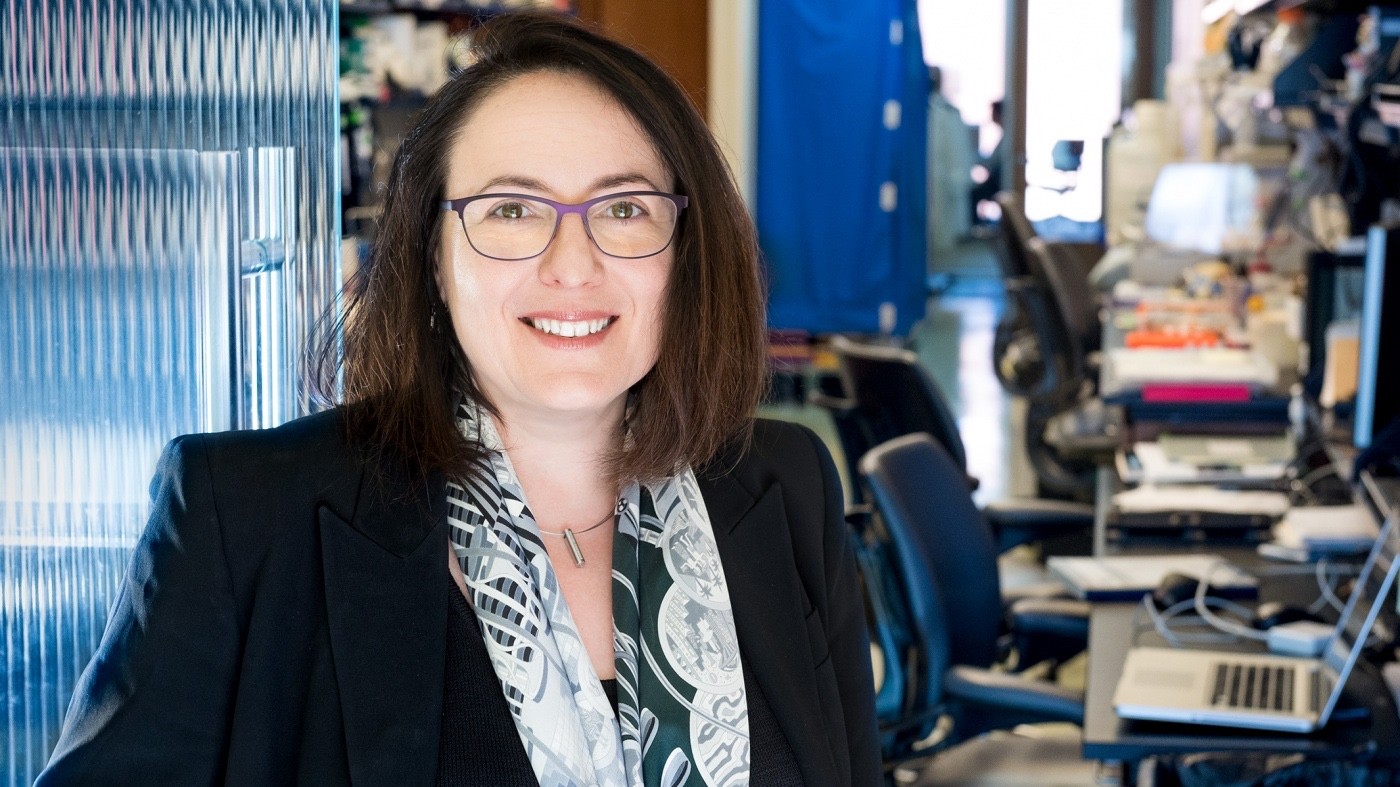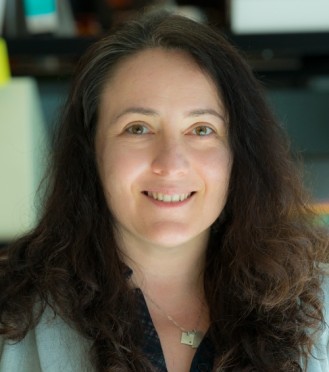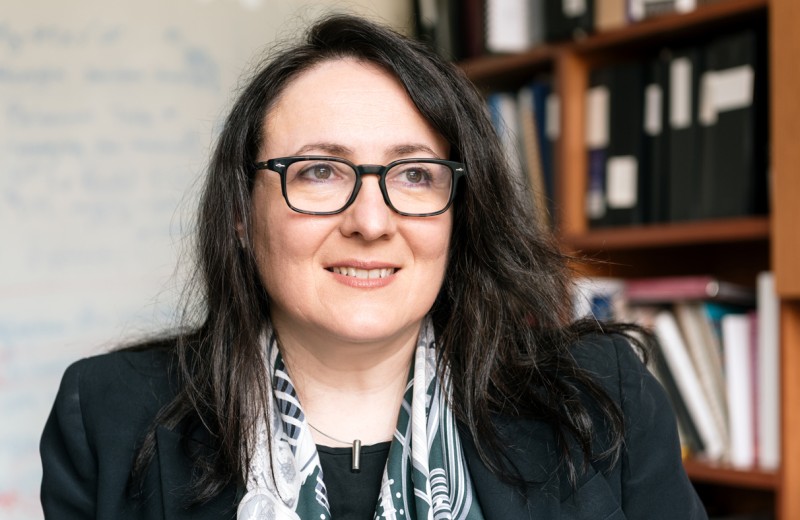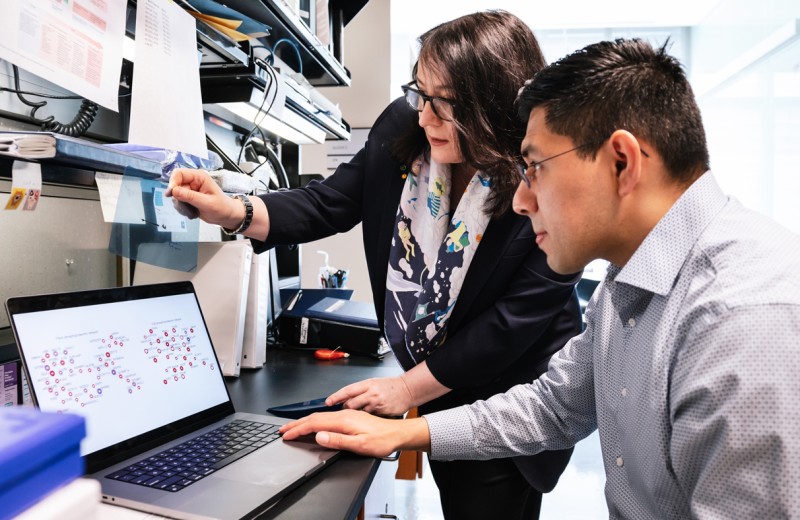Gladstone NOW: The Campaign Join Us on the Journey✕

Katerina Akassoglou, PhD, received the NINDS Research Program Award for her pioneering work on the intersection of the brain, immune, and vascular systems, and their role in neurological diseases. [Photo: Chris Goodfellow, Gladstone Institutes]
Gladstone Senior Investigator Katerina Akassoglou, PhD, was awarded a prestigious multi-year, multi-million dollar grant from the National Institute of Neurological Disorders and Stroke (NINDS).
The award is worth nearly six million dollars in direct costs, which will be administered over the next eight years. Akassoglou, who is also a professor in the department of neurology at the University of California, San Francisco, will use the grant to advance her research on the role of the brain’s vascular and immune systems in neurological diseases.
“NINDS created this pilot program to improve the value of the research it funds by enabling proven investigators to pursue long-range, innovative research instead of continually writing and submitting grant applications,” said Walter Koroshetz, M.D., the NINDS director.
“I am humbled and honored to receive this award, and I am extremely grateful to NINDS for their continued support of my research,” said Akassoglou. “Neurological diseases are a complex problem, and this grant will make it possible for my lab to pursue entirely new solutions for these devastating conditions.”
The NINDS Research Program Award (R35) provides longer-term support and increased flexibility to exceptional scientists who have a consistent record of high-impact contributions to neuroscience. It promotes ambitious, creative research and offers investigators greater freedom to embark upon research that breaks new ground.
Robert Finkelstein, PhD, NINDS associate director for the Division of Extramural Research, stated, “The NINDS Research Program Award is intended to give outstanding investigators more financial stability. Our goal is to allow these researchers to undertake bold, long-range projects and to establish a more stable training environment in their laboratories.”
Akassoglou’s research focuses on the intersection of the brain, immune, and vascular systems. Her lab pioneered the study of blood proteins in neurological diseases, showing that when these proteins leak into the brain, they damage brain cells and activate the brain’s immune system, triggering inflammation and neuron death. Akassoglou identified one blood protein in particular, fibrinogen, that is strongly implicated in multiple sclerosis. She thinks fibrinogen could be a therapeutic target for multiple sclerosis and many other neurological diseases. Her lab also discovered that a component of the membrane that envelops the cell nucleus plays a key role in regulating the activity of brain cells.
“We are excited about the basic scientific discoveries and therapeutic developments this prestigious award will enable, and we are proud of the confidence it reflects in Katerina and our institution,” said Lennart Mucke, MD, who directs the Gladstone Institute of Neurological Disease.
Featured Experts
Support Discovery Science
Your gift to Gladstone will allow our researchers to pursue high-quality science, focus on disease, and train the next generation of scientific thought leaders.
Meet Gladstone: Julia Kaye
Meet Gladstone: Julia Kaye
Julia Kaye is a neuroscientist at Gladstone Institutes dedicated to unraveling the mysteries of neurodegenerative diseases. Outside the lab, Kaye enjoys skateboarding, surfing, and exploring nature with her family.
Profile ALS Huntington’s Disease Multiple Sclerosis Neurological Disease KayeA New Era of Treating Neurological Diseases at the Blood-Brain-Immune Interface
A New Era of Treating Neurological Diseases at the Blood-Brain-Immune Interface
Gladstone scientists say it’s time to think differently about how to define and treat diseases such as Alzheimer’s and multiple sclerosis.
News Release Research (Publication) Alzheimer’s Disease Dementia Multiple Sclerosis Parkinson’s Disease Neurological Disease Akassoglou LabRevealing How Blood Triggers Brain Disease
Revealing How Blood Triggers Brain Disease
New research into how blood makes the brain’s immune cells toxic points to new treatments for Alzheimer’s disease and multiple sclerosis
News Release Research (Publication) Multiple Sclerosis Alzheimer’s Disease Center for Neurovascular Brain Immunology Neurological Disease Akassoglou Lab Krogan Lab Pico




